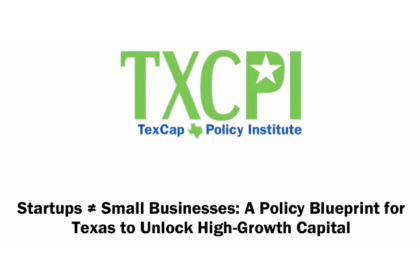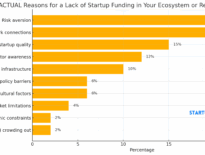
Published in collaboration with the TexCap Policy Institute, this new white paper is more than another call for “more startup support.” It’s a public policy intervention – one Texas desperately needs if we want to lead the nation in innovation, venture capital, and the next generation of job creation.
We titled it plainly:
Startups != Small Businesses
Because the policy makers, cities, and economic development offices tend conflate the two. And in doing so, it continues to fund the wrong things, regulate the wrong way, and misdirect every resource intended to make Texas the best place to build something bold.
Article Highlights
Why This Startup Policy Paper Had to Be Written
The “small business” designation is a catch-all that means everything and nothing. I tend to get uppity in the same way about someone saying they work in SaaS, AI, or even “tech” (Tech for what??). In Texas, it means you’re eligible for certain grants, procurement preferences, and development programs. But whether you’re launching a scalable tech company or opening a second dry cleaner, government tends to treat it all the same; funneled through the same lens.
That’s a problem. It’s a problem I’ve been tackling federally.
Startups are not smaller versions of businesses that already work. They are experimental. Risk-driven. Capital-intensive. They create net new markets, often before the market exists. They don’t need loans – they need early-stage equity. They don’t need storefront foot traffic – they need policy environments that encourage innovation, acquisitions, and reinvestment in talent.
Yet the ecosystem we’ve built doesn’t understand that. Or worse – ignores it.
Economic development programs continue to reward job counts over growth velocity. Bank loans are promoted over investment vehicles. And our workforce development initiatives remain focused on legacy industries or established company needs rather than emergent ones.
This is not just ineffective – it’s damaging.
What We Recommend for Texas Startups
In collaboration with the team at TexCap Policy Institute, we outline a specific, implementable framework for distinguishing between startup policy and small business support:
- Legislative recognition that startups are a unique category of enterprise, requiring differentiated treatment in statute and funding.
- Reforms to how economic development boards evaluate ROI – emphasizing long-term impact, not just short-term job creation.
- Capital formation strategies that align with startup stages: friends and family rounds, pre-seed and seed investment incentives, and access to accredited networks.
- Clarifying eligibility for programs like JETI, SBIR/STTR, and CAPCOs to prioritize high-growth intent over general business survival.
- Data and research initiatives that measure what startups actually need – not just what Main Street businesses say is “helpful.”
These aren’t theoretical ideas. They’re modeled on what’s working in cities like Nashville, Salt Lake, and Boulder – and based on direct input from startup founders, venture investors, and economic development leaders across the state.
What’s at Stake for Startups
We can keep pretending that one-size-fits-all entrepreneurship policy works – or we can get serious about being the best place in the world to start something new.
We can keep writing checks to businesses that will never scale – or we can build an innovation economy that brings outside capital into Texas, creates generational wealth, and trains the next workforce in real economic mobility.
The cost of inaction is falling further behind. The cost of confusion is watching our talent and capital flow to places that actually get it.
Texas is almost there. But almost doesn’t get us the exits, the IPOs, the seed-to-series C pipelines, or the global innovation reputation we claim to want.
What You Can Do
- Read the white paper ? Startups ? Small Businesses (TexCap)
- Share this post with policymakers, economic developers, or anyone running a startup support organization.
- Invite me to speak to your board, committee, or council about how Texas can realign its startup policy. We’ve built the blueprint – now it’s about execution.
- Push your region to differentiate startups from businesses in every incentive, grant program, and procurement process it runs.
One more time, here’s the paper
Download Here
This paper is a call to arms: for chambers of commerce, for capital allocators, for legislators who still think “entrepreneurship” means selling cupcakes from a food truck.
The future of our startup economy depends on whether we treat it like a future, or just a hobby for people too risky to get a loan.
Let’s stop confusing “starting a business” with building a startup. One is noble and important. The other is how we change the world.




Love this!!!
Nice work. On the National level we need to get the Govt. to modernize the original/first Federal tax incentive to stimulate more $s into startups QSBS Sec. 1244 – ‘The Impact Incentive’. See https://bit.ly/380p7wT
Working on it: https://paulobrien.substack.com/p/white-paper-why-governments-must
cc’ Bill Briggs
I have had these conversations with Lauren M. Postler. It is a critical distinction.
Bryan Eisenberg same. We’re talking about it more this week. I think it’s the difference between Texas figuring out how to be innovative and entrepreneurial, and leading the country as a result, or remaining behind.
Thanks for sharing, Paul
Startups generate wealth, jobs, and innovation. This is a great idea!
Thanks for the kind words Bryan! We’re working hard to create good policy in Texas.
NC leveraged capital from state funds that went to a handful of venture firms focused on investments in high growth + under-represented founders with goals of job creation and statewide economic development. As Paul O’Brien points out, startups are not Main Street businesses and have their own capital needs which are much higher on the front end, but have significant back end potential for said metrics.
Ramon P., cheers. Reinforces too the critical piece of the puzzle that agencies need focus and domain expertise in startups explicitly
Bryan Eisenberg Paul O’Brien and I will continue pounding this pulpit!
Excellent article Paul O’Brien, I totally agree with you. Our deep tech startup is a perfect example of what you describe. This discussion is long overdue!!! Thank you.
great article here
Good insights Paul, with much of the advice relevant and transferable to our context. I have shared with our Entrepreneurship Team and our Small Business Team
Exactly. Startups aren’t just small businesses with bigger dreams — they play by a different set of rules. Policy needs to catch up with that reality. Thanks for spotlighting this, Paul O’Brien
This convo really needed a spotlight. The gap between deep tech builders and how the world sees them can be wild sometimes.
Saurabh Srivastava more than a spotlight, trying to direct a laser to carve the two apart
So much waste, misled expectations, and bad advice, in blending them as one and the same.
Exactly! That laser-focused distinction you’re making is exactly what the ecosystem needs. Thanks for leading this important conversation, Paul.